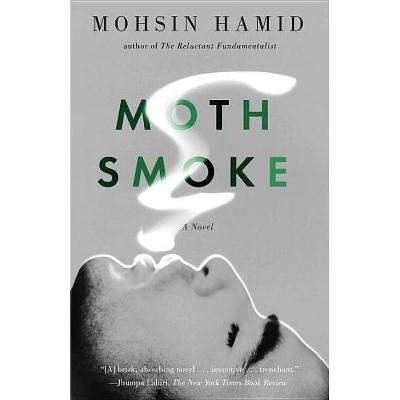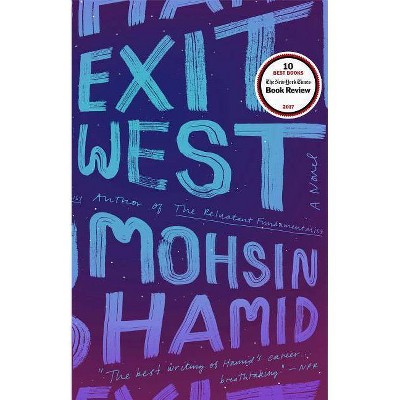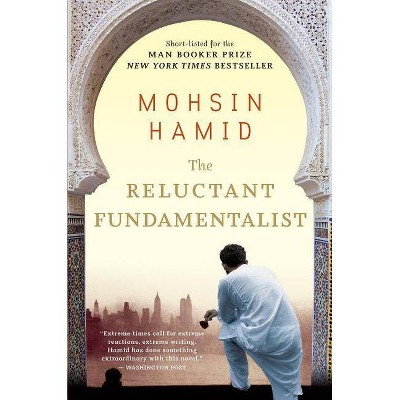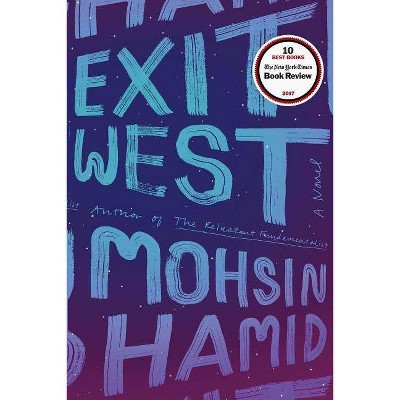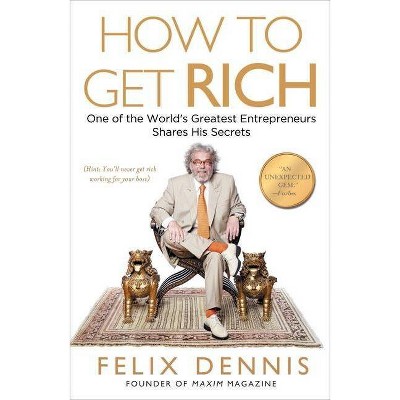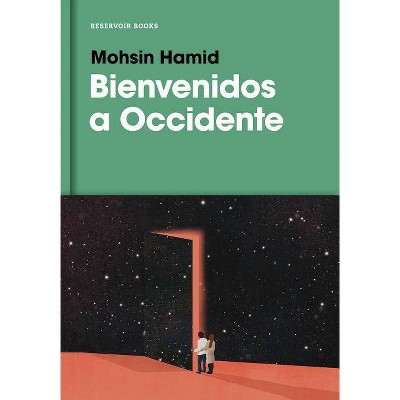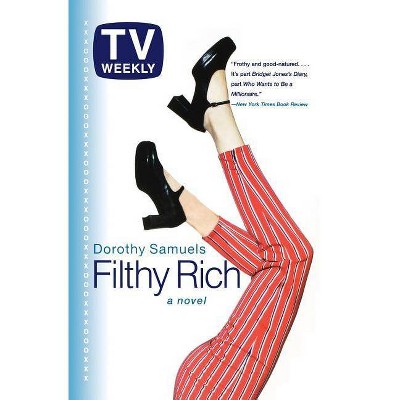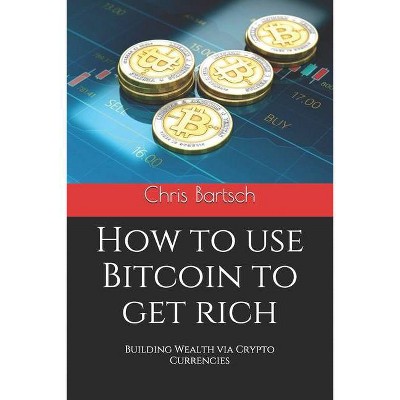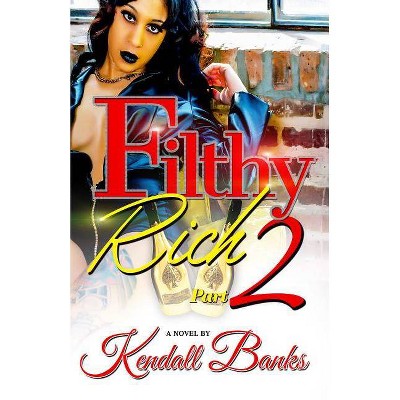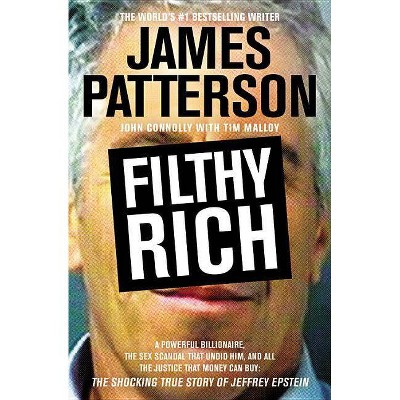How to Get Filthy Rich in Rising Asia - by Mohsin Hamid (Paperback)
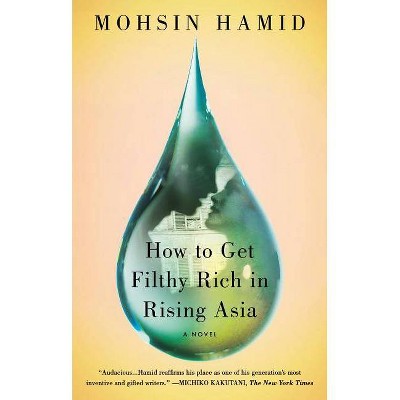
Similar Products
Products of same category from the store
AllProduct info
<p/><br></br><p><b> Book Synopsis </b></p></br></br><b>Mr. Hamid reaffirms his place as one of his generation's most inventive and gifted writers. -Michiko Kakutani, <i>The New York Times</i> <p/> A globalized version of <i>The Great Gatsby </i>. . . [Hamid's] book is nearly that good. -Alan Cheuse, NPR <p/> Marvelous and moving. -<i>TIME Magazine</i> <p/> From the internationally bestselling author of <i>The Reluctant Fundamentalist </i>and<i> Exit West, </i>the boldly imagined tale of a poor boy's quest for wealth and love <br></b><br> His first two novels established Mohsin Hamid as a radically inventive storyteller with his finger on the world's pulse. <i>How to Get Filthy Rich in Rising Asia</i> meets that reputation--and exceeds it. The astonishing and riveting tale of a man's journey from impoverished rural boy to corporate tycoon, it steals its shape from the business self-help books devoured by ambitious youths all over "rising Asia." It follows its nameless hero to the sprawling metropolis where he begins to amass an empire built on that most fluid, and increasingly scarce, of goods: water. Yet his heart remains set on something else, on the pretty girl whose star rises along with his, their paths crossing and recrossing, a lifelong affair sparked and snuffed and sparked again by the forces that careen their fates along. <p/> <i>How to Get Filthy Rich in Rising Asia </i>is a striking slice of contemporary life at a time of crushing upheaval. Romantic without being sentimental, political without being didactic, and spiritual without being religious, it brings an unflinching gaze to the violence and hope it depicts. And it creates two unforgettable characters who find moments of transcendent intimacy in the midst of shattering change.<p/><br></br><p><b> Review Quotes </b></p></br></br><br><b>"A showcase for its author's audacious talents... both an affecting and highly specific tale of love and ambition, and a larger metaphorical look at the startling social and economic changes that are ... changing the lives of millions" -- Michiko Kakutani, in her "10 Favorite Books of 2013," The New York Times <p/> A Foreign Policy Leading Global Thinker<br> Shortlisted for the DSC Prize for South Asian Literature<br> Named a Best or Notable Book of 2013 by The New York Times, National Public Radio, The Chicago Tribune, Vogue, Apple, The Observer (London), The Sunday Times (London), Financial Times, The Christian Science Monitor, Huffington Post, Kansas City Star, Milwaukee Journal-Sentinel, Book Page, Publishers Weekly, and Kirkus Reviews<br> A Vogue Favorite Novelist</b> <p/> "It is a measure of Mr. Hamid's audacious talents that he manages to make his protagonist's story work on so many levels. 'You' is, at once, a modern-day Horatio Alger, representing the desires and frustrations of millions in rising Asia; a bildungsroman hero, by turns knavish and recognizably human, who sallies forth from the provinces to find his destiny; and a nameless but intimately known soul, whose bittersweet romance with the pretty girl possesses a remarkable emotional power. <b>With <i>How to Get Filthy Rich in Rising Asia</i> Mr. Hamid reaffirms his place as one of his generation's most inventive and gifted writers</b>." -Michiko Kakutani, <i>The New York Times</i> <p/> "Thanks to Hamid's meticulous use of detail--and his sympathy for a man on the make in a society of endemic poverty--we engage deeply with a serious character whose essence remains his own yet who stands as a figure representative of his time and place, an effect only the best novelists can create... <b>This tale of an unscrupulous striver may bring to mind a globalized version of <i><i>The Great Gatsby</i></i></b>. Given the unabashed gimmickry of Hamid's how-to design, <b>it's a pleasant surprise to find that his book is nearly that good</b>." -Alan Cheuse, NPR <p/> A love story and bildungsroman disguised as a self-help book, and the result has all the inventiveness, exuberance and pathos that the writer's fans have come to expect... <b>Marvelous and moving</b>. -<i>TIME</i> <i>Magazine</i> <p/> "<b>Extraordinarily clever</b>... Hamid has taken the most American form of literature--the self-help book--and transformed it to tell... a surprisingly moving story." -Ron Charles, <i>The Washington Post</i> <p/> "The marriage of... two curiously compatible genres--self-help and the old-fashioned bildungroman--is <b>just one of the pleasures</b> of Mohsin Hamid's shrewd and slippery new novel, a rags-to-rishes story that works on a head-splitting number of levels. It's a love story and a study of seismic social change. It parodies a get-rich-quick book and <b>gestures to a new direction for the novel, all in prose so pure and purposeful it pases straight through into the bloodstream. It intoxicates</b>." -Parul Sehgal, <i>The New York Times Book Review</i> <p/> "<b>Wonderfully astringent</b>... Hamid is a sly witness to a traditional culture's dizzying trajectory--supermodels stalk city billboards; a drone hovers ominously in the sky--but <b>his satiric impulse gives way to compassion for the intimacies that keep us tethered in a rapidly changing world</b>." -<i>Vogue</i> <p/> "This is one of those original works that are also resonant as a record of human experience and geo-political shift, and a strong argument for Hamid as <b>one of the most important writers working today</b>. An enjoyable read no matter who 'you' are." -<i>The Daily Beast</i> <p/> <b>Relentlessly brilliant</b>... Hamid is a master stylist, and his third novel is, I think, <b>his best thus far</b>... There is something so rich and so deeply authentic in [the protagonist's] romance that its rendering alone hooks the reader... the novel ends with one of the most stunning final sentences I've read in contemporary fiction, a sentence that no review will ever quote, but an indelible sentence, which <b>will live in your heart, mind, and soul long after you read it</b>. -<i>The Los Angeles Review of Books</i> <p/> <b>Dazzling</b>...<b> an addictive, muscular piece of storytelling</b>... [<i>How To Get Filthy Rich in Rising Asia</i>] <b>shows a writer at the height of his powers</b>, with a hell of a story to tell... <b>a tremendous novel: tender, sharp and formally daring, a portal into a fast-moving, vividly realised world</b>. -<i>The Guardian</i> <p/> Mohsin Hamid's latest novel <b>boasts a startlingly distinctive voice as commanding and unadorned as its title</b>. -Pico Iyer, <i>The New York Times Book Review</i> <p/> Hamid exercises perfect control as he spins the life story of one man's struggle with turbulent times and economics in his unnamed Asian city. It's an impressive feat that he reveals this life, infancy to death, in a little more than 200 pages. That he achieves this with humor and pathos, and creates a last line that evokes the sweep of Molly Bloom's soliloquy in <i>Ulysses</i>--well, it knocked the skepticism right out of me... <b>Vivid, pungent and sweet, <i>How to Get Filthy Rich in Rising Asia</i> is the kind of well-told literary novel that restores faith in the genre. More of this, please.</b> -<i>Cleveland Plain Dealer </i> <p/> Hamid is as much an inventive stylist as he is a gifted storyteller... As a result, his novels are <b>compulsively readable</b>, and Rising Asia is no exception... <b>Tremendously profound and entertaining</b>. -Alex Gilvarry, <i>Boston Globe</i> <p/> "Bracingly inventive... it <b>might be the best book you read in 2013</b>." -<i>V Magazine </i> <p/> <b>Astounding... An ambitious, moving story </b>about love and loneliness [that] constantly surprises... by reinventing itself just as characters reinvent themselves... At the heart of the book is [the] consideration of what it means to succeed, to rise or to help oneself. How does one live and die? ...The questions simmer below the surface of this <b>tremendous<b>, </b>wise and surprisingly moral </b>book. -<i>The San Francisco Chronicle</i> <p/> "<b>An utter delight... How to Get Filthy Rich in Rising Asia is one of the most tender narratives you will ever read... Amazing</b>." -Counterpunch <p/> "Hamid is <b>one of the best writers working today</b>... <i><i>How to Get Filthy Rich in Rising Asia</i></i> is filled with flashes of brilliance, deeply moving passages, and ... beautifully clear prose." -<i>The Millions</i> <p/> "Mohsin Hamid's hotly anticipated new book tells the story of young love between capitalism and the latest target of its cupid's arrow: Asia... <b>Political, romantic, exciting, and a page-turner throughout</b>." -<i>Harper's Bazaar </i> <p/> <b>Brilliant</b>...<b> </b>In its cleverness, its slightly cruel satire and its complex understanding of both Western and Eastern paradigms, <i>How to Get Filthy Rich in Rising Asia</i> is pure Hamid... His storytelling style is <b>both timeless and contemporary</b>, a postmodern Scheherazade... This novel is smart about many things, including medicine and the processes of death, but is <b>smartest of all about literature itself</b>." -Marion Winik, <i>Newsday</i> <p/> Isn't this <b>the definition of great fiction</b>, that even when it begins with a character (tubercular, hiding on the dirt floor under his mother's cot) who's nothing like you, by the end you are convinced that it really <i><i>is</i></i> about you? That's <b>a kind of miracle</b>, of the sort that self-help books can only dream of achieving. -<i>Salon</i> <p/> The protagonist, who Hamid also calls 'you, ' is, despite the absence of a name or identified origin, a wonderfully particularized person... when, in the last stages of life, 'you' gains a measure of serenity and wisdom, you have tears in your eyes and know that <b>Hamid's novel has done that which few novels are capable of: It has deepened feeling and provoked questions about the meaning of your own world... gripping storytelling</b>." -<i>Washington Independent Review of Books</i> <p/> "<b>The kind of game Leo Tolstoy might have written</b>, clear-eyed in its dissection of human folly, ambition and love." -<i>Milwaukee Journal Sentinel </i> <p/> "Although Hamid's fictional works vary in style and substance, a distinctive sensibility pervades all three: <b>simultaneously warm and ironic, elegant and profane, urbane but equipped with a strong B.S. detector</b>." -<i>The Los Angeles Times</i> <p/> In just 12 crisp chapters, you go from a diseased rural nobody to the model of self-made success. It is quite a journey... <b>[A] considerable literary talent [who] deploy[s] the second-person narrative with astonishing skill</b>... Hamid depicts a land where getting rich is not so much a luxury as a survival tactic. -<i>The Economist</i> <p/> "<b>My recommendation for book groups </b>this month is Mohsin Hamid's wry third novel, <i>How to Get Filthy Rich in Rising Asia, </i> and it might just satisfy both reluctant and bold literary explorers. It is at once accessible and exotic, and most definitely filthy rich in fresh material for literary discussion... [that] offers a surprisingly heartfelt conclusion." -<i>Christian Science Monitor</i> <p/> <b>An astonishing and riveting tale </b>of a man's journey from impoverished rural boy to corporate tycoon. -<i>The Nation</i> <p/> "<b>Fiction fans should be grateful </b>Mohsin Hamid left his New York corporate cubicle to pursue his grand ambitions of becoming a novelist." -<i>The Atlantic</i> <p/> "<b>Effervescent... a universal story, wrought in tightly minimal, evocative prose</b>... Mr. Hamid has delivered a payload more nourishing than any self-help book." -<i>The New York Observer</i> <p/> A <b>powerful reverie </b>on life in a time of soul-shaking change. -<i>Businessweek</i> <p/> Hamid's choice to write a bildungsroman wrapped inside a self-help manual is an <b>inspired </b>one... Hamid has left us with no doubts about how state and market, law and crime, nation and corporation, and money and violence go together--in rising Asia as in the rest of the world. -<i>Bookforum</i> <p/> "Mohsin Hamid is one <b>of the most talented and formally audacious writers of his generation, </b> and his electrifying new novel... is a vital and affecting portrait of a teeming and significant, but largely unrecorded culture. It is a bold formal experiment contained within an elegant novella. It is moving and charming and funny. When you reach the end, you want to go straight back to the beginning. And yes--that does mean you." -<i>The Telegraph</i> <p/> "Mohsin Hamid's third novel... is many things--a love story; an interrogation of the purpose of literary fiction; a portrait of an Asian city... <b>In its compassionate glimpse into another's life, Hamid's novel suggests that the routes to success prescribed by self-help books are less hopeful and compelling than the moments that a novel so treasures, the moments in which life is lived.</b>" -<i>The Sunday Telegraph</i> <p/> "An ultra-intelligent and knowing account of life in the developing world, as well as an increasingly moving love-story... <b>Simply brilliant</b>." -<i>The Daily Mail</i> <p/> "<b>Daringly original</b>... <b>page-turning</b>." -<i>The Independent </i> <p/> "Cast as a self-help book, about one man's rise from poverty to wealth... Hamid's <b>beautifully conceived and exquisitely executed</b> novel demonstrates that, in the right hands, narratorial tricks can be a serious matter, affording slants on the big realities and myths of our time unavailable to meat-and-potato realism." -Adam Lively, <i>The Sunday Times</i> <p/> "<i>How to Get Filthy Rich in Rising Asia </i>turns out to be <b>as much moral fable as it is satire.</b> Fortunately, Hamid makes each mode as fresh as the other." -<i>New Statesman</i> <p/> "The many selves of You, our hero, form <b>a portrait gallery of a disconnected man in a discontinuous world</b>. Self-help books that aren't a novel try to make sense of all this. And fail." -Bryan Appleyard, <i>The Sunday Times</i> <p/> <i></i>At once a quietly moving story of an individual man and <b>a sweeping epic</b> chronicling the economic, social and cultural development of an entire region of the world. -<i>Vox Magazine</i> <p/> Hamid's story is <b>at once fable-like and existential</b>... the novel is a parable about a new kid of loneliness, a homelessness quite different from the one characteristic of the protagonist's impoverished and uncertain beginnings. -<i>The Financial Times</i> <p/> <i>How to Get Filthy Rich in Rising Asia </i>is dead short and narrated in a weird way that rarely gets done in novels... It's a winning and surprisingly readable bash at some pretty wild experimentation. Hamid's portrait of rising Asia makes bold use of <b>a newfangled way of compressing a whole life into 200 zipalong 'hit book' pages</b>. -<i>Dazed and Confused</i> <p/> Ambition rules in this playful third novel... <b>subtle and rich</b>. -<i>Publishers Weekly</i> <p/> "<b>This brilliantly structured, deeply felt book is written with the confidence and bravura of a man born to write</b>. Hamid is at the peak of his considerable powers here, and delivers a tightly paced, preternaturally wise book about a thoroughly likable, thoroughly troubled striver in the messiest, most chaotic ring of the global economy. Completely unforgettable." -Dave Eggers, author of <i>A Hologram for the King</i> <p/> <b>Mohsin Hamid is one of the best writers in the world, period</b>. Only a master could have written this propulsive tale of a striver living on the knife's edge, a noir Horatio Alger story for our frenetic, violent times. The road to filthy riches is nasty, brutish, and long, yet Hamid's talent is such that we see the humanity in all this striving--indeed, on finishing this extraordinary book, one wonders if the striving might be the sincerest expression of our flawed, fragile humanity. -Ben Fountain, author of <i>Billy Lynn's Long Halftime Walk</i> <p/> "A dazzling stylistic tour de force; a love story disguised as a self-help guide, freighted with sly social satire. <b>As timely and timeless a novel as I've read in years</b>." -Jay McInerney, author of <i>Bright Lights, Big City</i> and <i>How It Ended</i> <p/> "<b>A marvelous book</b>." -Philip Pullman, author of <i>The Golden Compass</i><br><p/><br></br><p><b> About the Author </b></p></br></br><b>Mohsin Hamid </b>is the author of the international bestsellers <i>Exit West</i> and <i>The Reluctant Fundamentalist</i>, both finalists for the Man Booker Prize. His first novel, <i>Moth Smoke</i>, won the Betty Trask Award and was a finalist for the PEN/Hemingway Foundation Award. His essays, a number of them collected as <i>Discontent and Its Civilizations</i>, have appeared in <i>The New York Times</i>, the <i>Washington Post</i>, <i>The New York Review of Books</i>, and elsewhere. He lives in Lahore, Pakistan.
Price History
Cheapest price in the interval: 9.99 on November 8, 2021
Most expensive price in the interval: 9.99 on December 20, 2021
Price Archive shows prices from various stores, lets you see history and find the cheapest. There is no actual sale on the website. For all support, inquiry and suggestion messages communication@pricearchive.us
